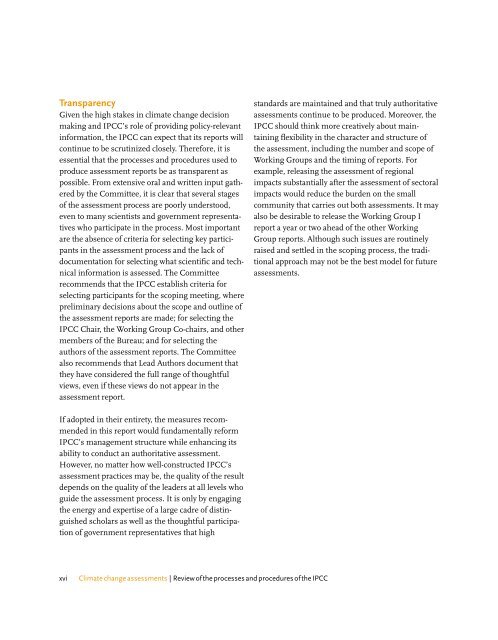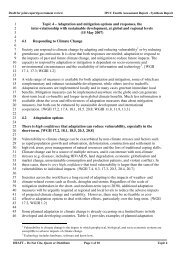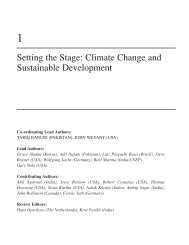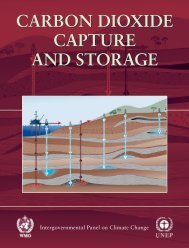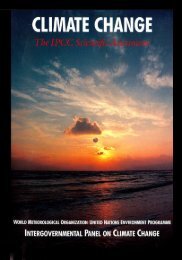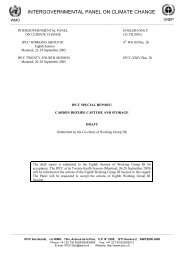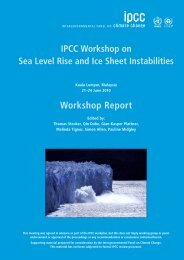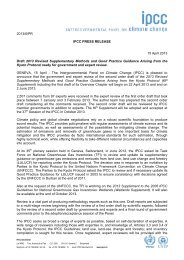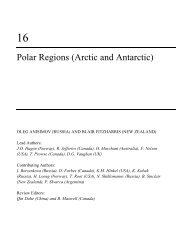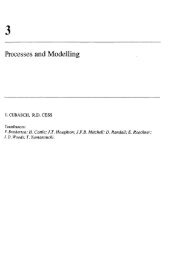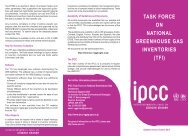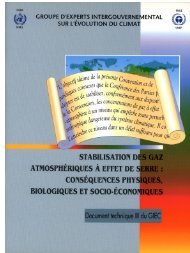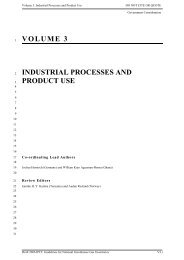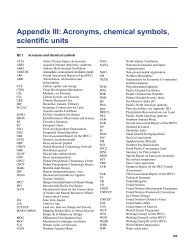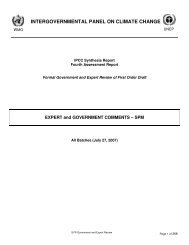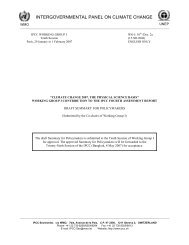Climate change assessments Review of the processes and ...
Climate change assessments Review of the processes and ...
Climate change assessments Review of the processes and ...
You also want an ePaper? Increase the reach of your titles
YUMPU automatically turns print PDFs into web optimized ePapers that Google loves.
Transparency<br />
Given <strong>the</strong> high stakes in climate <strong>change</strong> decision<br />
making <strong>and</strong> IPCC’s role <strong>of</strong> providing policy-relevant<br />
information, <strong>the</strong> IPCC can expect that its reports will<br />
continue to be scrutinized closely. Therefore, it is<br />
essential that <strong>the</strong> <strong>processes</strong> <strong>and</strong> procedures used to<br />
produce assessment reports be as transparent as<br />
possible. From extensive oral <strong>and</strong> written input ga<strong>the</strong>red<br />
by <strong>the</strong> Committee, it is clear that several stages<br />
<strong>of</strong> <strong>the</strong> assessment process are poorly understood,<br />
even to many scientists <strong>and</strong> government representatives<br />
who participate in <strong>the</strong> process. Most important<br />
are <strong>the</strong> absence <strong>of</strong> criteria for selecting key participants<br />
in <strong>the</strong> assessment process <strong>and</strong> <strong>the</strong> lack <strong>of</strong><br />
documentation for selecting what scientific <strong>and</strong> technical<br />
information is assessed. The Committee<br />
recommends that <strong>the</strong> IPCC establish criteria for<br />
selecting participants for <strong>the</strong> scoping meeting, where<br />
preliminary decisions about <strong>the</strong> scope <strong>and</strong> outline <strong>of</strong><br />
<strong>the</strong> assessment reports are made; for selecting <strong>the</strong><br />
IPCC Chair, <strong>the</strong> Working Group Co-chairs, <strong>and</strong> o<strong>the</strong>r<br />
members <strong>of</strong> <strong>the</strong> Bureau; <strong>and</strong> for selecting <strong>the</strong><br />
authors <strong>of</strong> <strong>the</strong> assessment reports. The Committee<br />
also recommends that Lead Authors document that<br />
<strong>the</strong>y have considered <strong>the</strong> full range <strong>of</strong> thoughtful<br />
views, even if <strong>the</strong>se views do not appear in <strong>the</strong><br />
assessment report.<br />
st<strong>and</strong>ards are maintained <strong>and</strong> that truly authoritative<br />
<strong>assessments</strong> continue to be produced. Moreover, <strong>the</strong><br />
IPCC should think more creatively about maintaining<br />
flexibility in <strong>the</strong> character <strong>and</strong> structure <strong>of</strong><br />
<strong>the</strong> assessment, including <strong>the</strong> number <strong>and</strong> scope <strong>of</strong><br />
Working Groups <strong>and</strong> <strong>the</strong> timing <strong>of</strong> reports. For<br />
example, releasing <strong>the</strong> assessment <strong>of</strong> regional<br />
impacts substantially after <strong>the</strong> assessment <strong>of</strong> sectoral<br />
impacts would reduce <strong>the</strong> burden on <strong>the</strong> small<br />
community that carries out both <strong>assessments</strong>. It may<br />
also be desirable to release <strong>the</strong> Working Group I<br />
report a year or two ahead <strong>of</strong> <strong>the</strong> o<strong>the</strong>r Working<br />
Group reports. Although such issues are routinely<br />
raised <strong>and</strong> settled in <strong>the</strong> scoping process, <strong>the</strong> traditional<br />
approach may not be <strong>the</strong> best model for future<br />
<strong>assessments</strong>.<br />
If adopted in <strong>the</strong>ir entirety, <strong>the</strong> measures recommended<br />
in this report would fundamentally reform<br />
IPCC’s management structure while enhancing its<br />
ability to conduct an authoritative assessment.<br />
However, no matter how well-constructed IPCC’s<br />
assessment practices may be, <strong>the</strong> quality <strong>of</strong> <strong>the</strong> result<br />
depends on <strong>the</strong> quality <strong>of</strong> <strong>the</strong> leaders at all levels who<br />
guide <strong>the</strong> assessment process. It is only by engaging<br />
<strong>the</strong> energy <strong>and</strong> expertise <strong>of</strong> a large cadre <strong>of</strong> distinguished<br />
scholars as well as <strong>the</strong> thoughtful participation<br />
<strong>of</strong> government representatives that high<br />
xvi<br />
<strong>Climate</strong> <strong>change</strong> <strong>assessments</strong> | <strong>Review</strong> <strong>of</strong> <strong>the</strong> <strong>processes</strong> <strong>and</strong> procedures <strong>of</strong> <strong>the</strong> IPCC


